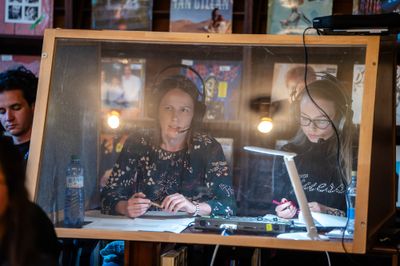
Audiovision Without Barriers V: On (Un)Met Accessibility Standards in Film Distribution
| Extra | Inclusive subtitles provided, Audiodescription provided |
|---|
Imagine this: You walk into a cinema, full of excitement about the main feature. But soon, your enthusiasm is dampened by the same old barriers. The information is confusing, descriptive subtitles are nowhere to be seen, nor is there any audiodescription or technology you would and should expect. Even though discussions of accessibility and inclusion are ever more widespread and standard, actual film distribution and screenings show that the same still cannot be said about making audiovisual works accessible to people with hearing or vision impairments. Why is that the case?
Now in its fifth year, the annual discussion on accessibility and inclusion in film and cinema for people with sensory impairments will look at the growing number of initiatives across Europe that aim to make film, cinemas, and media more inclusive. Alongside experts in audiovisual accessibility, filmmakers, managers of successful projects, relevant institutions, and community representatives, we’ll explore how the situation has evolved here in Slovakia.
It’s good to see that things are moving forward here too – even if not as fast as we’d hope. Where have we seen genuine improvement, and where are we still caught in a loop? What changes are needed in the system to make cinemas truly open spaces? What’s the cost of accessibility, what are we losing out on, and how much could we gain if we got it right? And who bears the responsibility?
Join us for an open debate and add your voice to the discussion on (un)met accessibility standards, where technical solutions fall short, and what needs to change to make the cinema experience something everyone can enjoy.
Guests:
Josélia Neves, world expert in accessibly and inclusive design, Portugal.
Joanna Stankiewicz, head of development, promotion and public engagement for the international project Cinema Without Barriers, ZAMEK Culture Centre in Poznan, Poland.
Richard Kováčik, cinema programmer, board member of the Slovak Audiovisual Fund
Renáta Majerčáková, representative of the Deaf community, member of the Slovak Association of Deaf Youth Clubs Committee.
Peter Kozák, representative of audiences with vision impairment, actor, marketer.
Hosted by Emília Perez, accessibility expert, Department of Translation Studies, Faculty of Arts, Constantine the Philosopher University in Nitra.
Simultaneous interpretation from / into Slovak sign language will be provided for both deaf and hard-of-hearing attendees, as well as from Slovak into English.
The panel discussion is co-organized by the Department of Translation Studies, Constantine the Philosopher University in Nitra, as part of the VEGA 2/0092/23 project Translation and Translating in the History and Present of the Slovak Cultural Space.
Free admission
This event has already taken place | This event has already taken place |